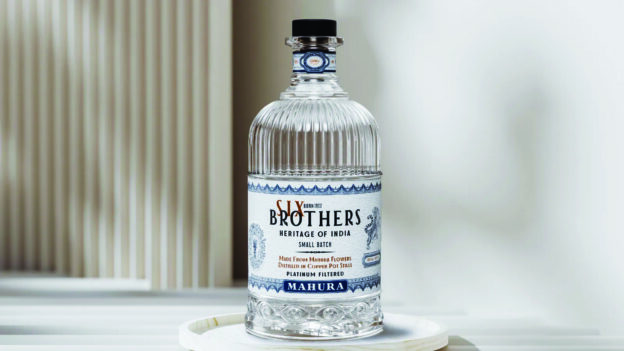What began as a family experiment in Dahanu has grown into one of India’s most distinctive houses of whisky. South Seas Distilleries now brings the same discipline of craft to Crazy Cock and Six Brothers Mahura; spirits built on legacy and made for the present.
The story of South Seas Distilleries and its modern incarnation, Six Brothers Mahura, unfolds across a century. It begins in 1922, when six Parsi brothers—Khurshedji, Faramroze, Rustomji, Kuvarji, Nanabhoy, and Jehangirji—turned their gaze inward, towards the soil of India itself. While the colonial elite toasted imported blends, the brothers sought a flavour born of Indian wilderness; a flower that had perfumed tribal celebrations for centuries. They found it in the mahua blossom.
That pursuit gave rise to what would become India’s earliest recorded distillery for luxury indigenous spirits. The brothers captured the mahua’s delicate nectar and distilled it through copper stills that gleamed under Dahanu’s coastal sun. The result carried fragrance both earthy and floral; a creation that drew admiration from princely patrons and curious palates alike. The Maharajas of Jawhar and Akkalkot tasted it and declared it remarkable. For a moment, the native bloom found a seat beside the imported malt.
Then history intervened. Prohibition arrived like a curtain drawn mid-performance. Stills cooled, cellars emptied, and the brothers’ labour faded into legend. The mahua returned to forest soil. Its spirit—literal and symbolic—fell silent.
Decades passed. Generations scattered. Yet memory survived, fragile but persistent, within a few stories whispered through the family. One man, Jehangirji Behramji Kohinoor, refused to let it vanish entirely. In 1984, at seventy-three, he decided that the distilling heritage of his kin must live again. He chose Dahanu as his ground of renewal, a coastal expanse between the Arabian Sea and the Sahyadris. There he founded South Seas Distilleries, restoring copper stills to flame.
What emerged was less a reconstruction than a resurrection. Against skepticism, Jehangirji installed India’s largest copper pot stills and built the country’s biggest privately owned maturation warehouse. Critics doubted whether whisky could mature in tropical heat without losing itself to evaporation. Yet the barrels filled, and time performed its silent alchemy. The whisky matured with unexpected complexity; touched by sea breeze, sunlight, and the patient rhythm of Indian weather.

Years turned into decades. The distillery grew under the stewardship of successive generations, guided by principles that favoured patience over haste, restraint over spectacle. The Chinoy family, descendants and present custodians, continued the founder’s path. This chronicle was told to us by Hamavand Chinoy and Rupi Chinoy, Directors of South Seas Distilleries, who now guard the lineage.
A Legacy Reignited
Their ethos stands on simple conviction: excellence matures through time, not acceleration. The copper stills, massive and burnished, are treated as instruments of character, not machines of speed.
From this philosophy came the company’s first consumer brand, Crazy Cock Single Malt Whisky, in 2023. Its two expressions—Rare, the unpeated variant, and Dhua, the peated—form an eloquent dialogue between subtlety and smoke. The name itself holds meaning layered with sentiment. “Crazy” pays tribute to the founder’s audacity, his unflinching pursuit of perfection, and the years of waiting that turned conviction into spirit. “Cock” was chosen as the mascot because the rooster’s call heralds a new dawn; a poetic emblem for South Seas’ renewal and the awakening of Indian single malts on the global stage.
Rare matures in bourbon and sherry oak casks within India’s largest copper stills, offering aromas of honey, pear, chocolate, raisin, cinnamon, and vanilla. Dhua, its lightly peated sibling, draws from first-fill bourbon and sherry casks, revealing dark chocolate, mandarin, oak, and a trace of smoke. Both carry a deep amber colour and a silken finish, reflecting the tropical maturation unique to Dahanu’s climate.
The Flower Returns
A year later, in April 2024, South Seas introduced Six Brothers Mahura, a spirit born again a century after its first creation. The release was hailed as India’s most exclusive small-batch heritage spirit, limited to 102 bottles priced at ₹1,02,000.
It honours the pioneers whose names crown its label. The blossom once regarded as rustic gained new finesse through double distillation and platinum filtration. In the glass, the spirit reveals warmth balanced with clarity; aromas of figs, raisins, dried hay, ginger, pepper, and apricot. Its taste unfolds in layers: a hint of salinity, traces of fruit, and a whisper of spice that lingers. Its adaptability has made it a favourite among mixologists and connoisseurs alike. Bandra Born in Mumbai has even launched the world’s first dedicated Mahura bar, serving cocktails built entirely around Six Brothers expressions that have become signature draws for the city’s patrons.
Each bottle carries symbols that narrate its ancestry. Six pairs of engraved eyes form a circle at the base; sentinels representing the brothers who began it all. A single all-seeing eye crowns the closure, signifying their shared vision. The tiger that marks the label is not decoration but emblem; a creature drawn from the forests where the mahua blooms, embodying endurance, confidence, and native strength.
To walk through the distillery today is to witness tradition entwined with invention. Rows of casks stand in patient formation, their staves breathing with moisture and craft. Workers test temperature by feel, marking variations in chalk upon wood.
South Seas Distilleries, once a local venture reborn from family lore, now stands among India’s most respected producers of malt and indigenous spirits. Yet the company remains resolutely private in tone, disinterested in corporate spectacle. Its focus lies in substance, a discipline that traces its roots back to 1922, when six brothers dared to dream of distilling the Indian earth itself.
When Hamavand and Rupi speak of the distillery, they describe not a company but an inheritance that breathes. The copper stills remain burnished and loyal. The casks sleep in Dahanu’s humidity, surrendering what they must, preserving what they can. In their aroma lies the persistence of memory; the same fragrance that once enchanted princes, now refined for a global connoisseur.

